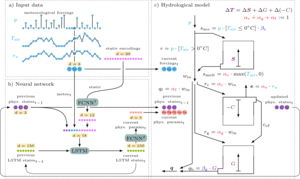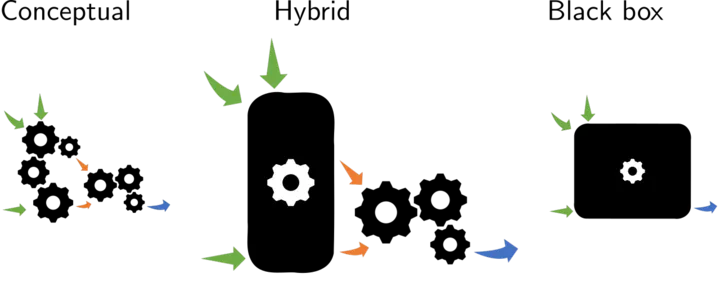- Hybrid modeling of evapotranspiration: inferring stomatal and aerodynamic resistances using combined physics-based and machine learning. Environmental Research Letters 18 (3), 2023, 034039 more… Full text ( DOI )
- Towards hybrid modeling of the global hydrological cycle. Hydrology and Earth System Sciences 26 (6), 2022, 1579-1614 more… Full text ( DOI )
- HYBRID MODELING: FUSION OF A DEEP LEARNING APPROACH AND A PHYSICS-BASED MODEL FOR GLOBAL HYDROLOGICAL MODELING. ISPRS - International Archives of the Photogrammetry, Remote Sensing and Spatial Information Sciences XLIII-B2-2020, 2020, 1537-1544 more… Full text ( DOI )
- Towards global hybrid hydrological modeling by fusing deep learning and a conceptual model. EGU General Assembly, 2020 more… Full text ( DOI )
- Identifying Dynamic Memory Effects on Vegetation State Using Recurrent Neural Networks. Frontiers in Big Data 2, 2019 more… Full text ( DOI )

The dynamics of ecosystems and earth systems are often difficult to model and predict, and even today many machine learning approaches fail to encode temporal dependencies that typically characterize dynamic natural systems. However, deep learning approaches in the time domain (e.g. recurrent neural networks) are conceptually capable of solving such problems. However, such models are difficult or impossible to interpret physically, which limits the scientific knowledge gained from them.
The combination of machine learning and physically-based modeling, hybrid modeling , is intended to research and further develop possible ways of gaining scientific knowledge about the observed phenomena despite the black box character of the models used and thus the potential of temporal deep learning approaches for to be able to use the modeling of ecosystem processes.
